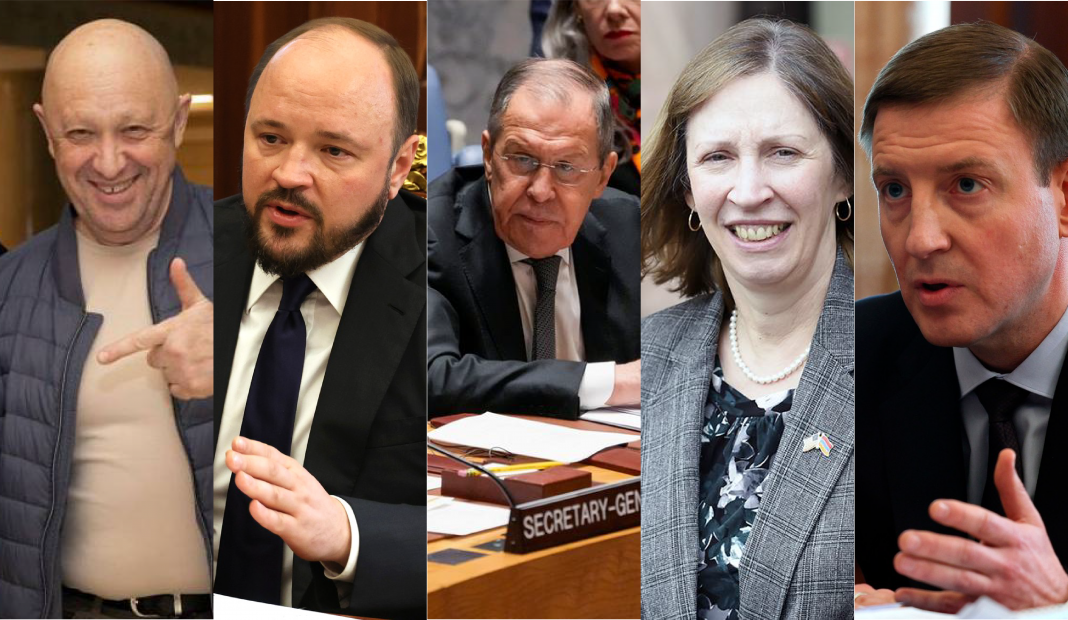This report describes the key events that significantly impacted Russia’s political, economic and social processes.
Based on the results of the past week, the following trends can be summarised:
- Intra-clan struggle is significantly intensifying, caused by several factors simultaneously. At the same time, if, in the case of an active election campaign, the demonstration of the ambitions of individuals looks quite logical, and is also completely controlled by the Kremlin, then the general state of the system demonstrates the natural obsolescence and unwillingness of the younger generation of technocrats and people in business to put up with outdated rules and norms. Such a “rebellion” requires new solutions from Putin.
- The growing confrontation in the military camp demonstrates several patterns that testify to a real crisis in the system and absolutely planned and technologically built actions. Against this background, the rise of Yevgeny Prigozhin in the media space once again confirms Ascolta’s information about the formation of the image of the hawk leader in Putin’s entourage. This technology is fully coordinated with the Kremlin and is developing in a controlled direction. At the same time, the conflict between Prigozhin and Shoigu is only one of the elements of the game which can cost the latter his position.
- Russia is increasingly demonstrating its fatigue from the West’s failure to meet the conditions of the “grain deal”. Realising the absence of any instruments of influence, the Russian authorities turn to outright blackmail, which does not look very convincing. At the same time, several trends in the West demonstrate that the “grain deal” itself is becoming obsolete, which may indicate a tacit agreement on the issue of stopping it. At the same time, Russia is increasingly trying to launch the Togliatti-Odesa ammonia pipeline, which may shortly become a new security factor in the Black Sea region.
This Content Is Only For Subscribers
On April 24th-30 th the following topics were the most relevant for Russia:
- Vladimir Putin’s meeting with First Deputy Chairman of the Federation Council Andrey Turchak
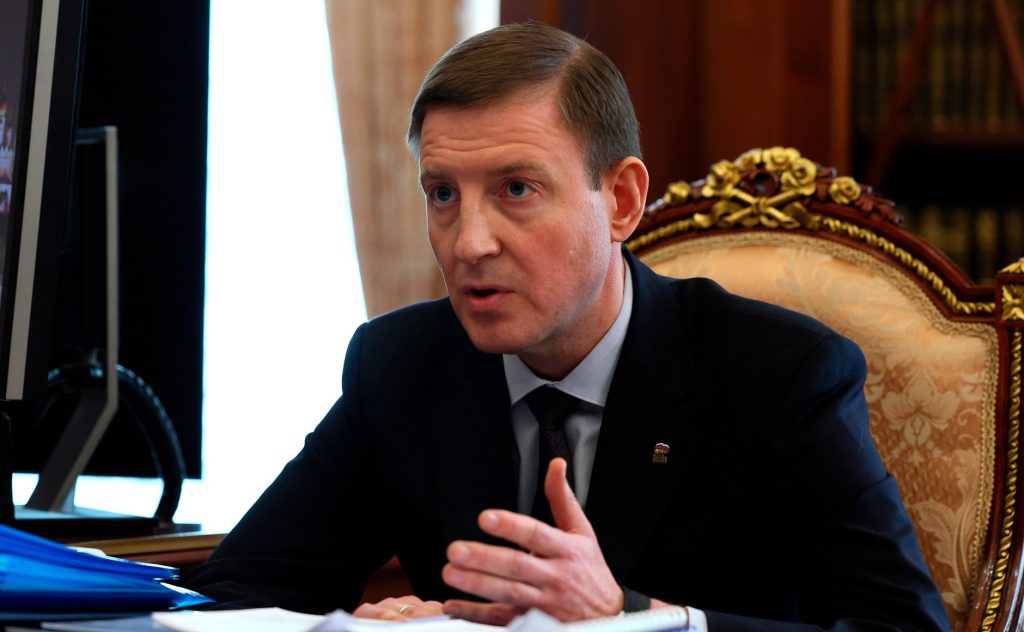
On Monday, April 24, Vladimir Putin held a working meeting with the First Deputy Chairman of the Federation Council, the head of the working group for ensuring interaction between public authorities and organisations on issues of mobilisation training and mobilisation, social and legal protection of Russian citizens participating in the so-called “SMO”, and members of their families by Andrei Turchak. According to official data, the main topic of the meeting was the discussion of the work of the parliamentary group on social and legal support for the military.
Key theses:
- Turchak: “To date, more than 25 thousand appeals [from participants in the so-called “SMO”] have been processed.”
- In the open part of the meeting, Turchak suggested considering some new proposals:
- The first is a seamless transition between military and civilian medicine, that is, the operation of a single insurance policy in both military and civilian medical institutions.
- The second proposal concerns the expansion of the powers of members of the territorial defence in some regions where the yellow level of response has been introduced. In particular, we are talking about granting participants in territorial defence the right to carry firearms.
- The third proposal concerns military mortgages. Now privates and sergeants who have served under a contract for more than three years have the right to become participants in a military mortgage while the state pays the loan for the purchased housing. Turchak proposes to reduce this period for all participants in the so-called “SMO”.
- The fourth proposal concerns monetary allowances. A mobilised volunteer receives today 195 thousand rubles, regardless of the place of service: on the front line or in the rear, and a contract soldier – only if he is directly on the front line. Turchak proposes to equalise all military personnel in the level of receiving allowances.
- The fifth proposal concerns a similar equation for all payments for children.
- In turn, Putin noted the point of equalising all financial payments.
Outcomes and outlook:
It is striking that Vladimir Putin has recently been actively bringing Andrei Turchak, his friend’s son, closer and deliberately increasing his weight in Russian politics. Formally, Turchak is Valentina Matviyenko’s deputy in the Federation Council, but in reality, his weight is much greater than just the deputy speaker of the upper house of parliament. He actively fronted against the Kovalchuk-Kiriyenko group, entered into a frank confrontation with Sergei Kiriyenko, promoted his governors and deputies, and influenced the United Russia party (in influencing the party, he even moved Dmitry Medvedev).
Turchak has his group of experts and his relations with media groups. He is trying to influence the situation in the occupied territories (last year, he repeatedly visited the occupied cities of Donbas, Zaporizhzhia and Kherson oblasts). The current meeting is a signal: Turchak will continue to be an influential figure associated with the situation in the Armed Forces, in the so-called “SMO”, and in veteran structures. Rumours have already appeared in Russia that Turchak may at some stage qualify for a serious post in the Ministry of Defense (and, perhaps, even replace Sergei Shoigu).
Moreover, Turchak is trying to improve relations with many people who today are in a mode of confrontation with Shoigu (Kadyrov, Prigozhin). In any case, Turchak is a figure that is subject to more careful monitoring since his informal role in the so-called “special military operation” is quite large.
- Vladimir Putin meets with the president of the Russian Association of Fertilizer Producers, Andrey Guryev
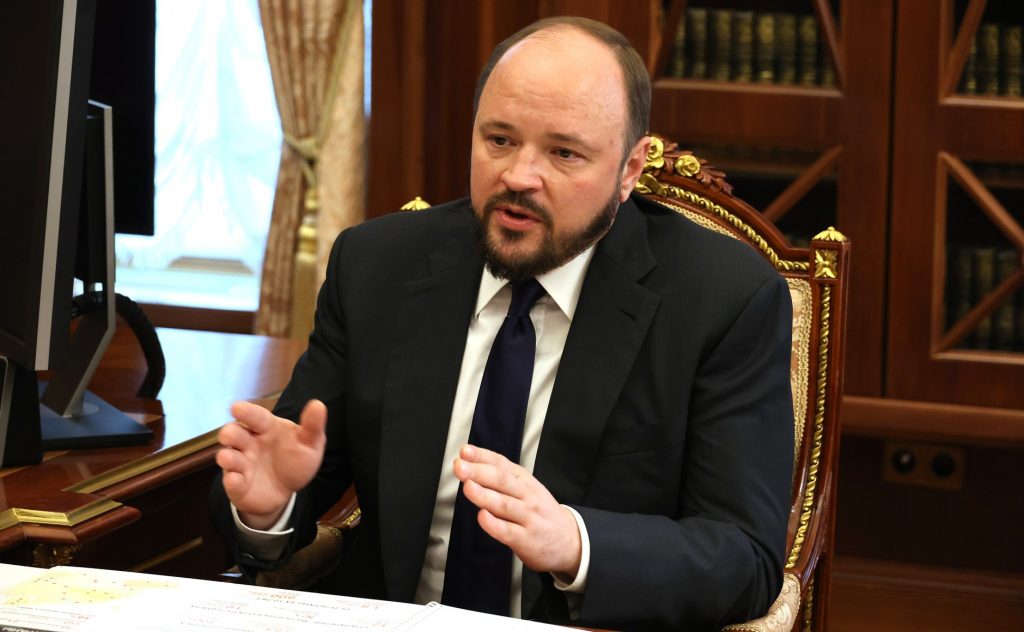
On Thursday, April 27, Vladimir Putin held a meeting with Andrey Guryev, President of the Russian Association of Fertilizer Producers, during which they discussed the fertiliser industry issues in Russia, as well as international sanctions and the work of the “grain deal”.
Key theses:
- Vladimir Putin: “Over the past ten years, Russia has increased fertiliser production by 40 per cent, has become one of the world’s leading fertiliser producers and is fully self-sufficient in all major types of fertilisers. But we also know the challenges the industry is facing today.”
- Guryev: “Over the past ten years, we have increased production by 40 per cent – up to 55 million tons – of all types of fertilisers. We have surpassed the United States, India in production and are now the world’s largest producer of mineral fertilisers after China.”
- Guriev: “In 2013, a new investment cycle began in our industry; 1.8 trillion rubles were invested – big numbers. During this time, we have paid more than 600 billion rubles in taxes alone. In 2022, we paid about 200 billion in taxes, a record for our industry.”
- Guryev: “Speaking of exports, over the past ten years, Russia has provided one-third of the entire growth in the production of mineral fertilisers in the world. For ten years, we have grown by about 50 per cent in nitrogen, 55 per cent in phosphorus, and about 30 per cent in potassium. Of course, there is a fall in 2022, but it is again associated with sanctions and so on.”
- Guryev: “Russian exports in 2022 compared to 2021, a record one, fell by 15 per cent precisely because of the imposition of sanctions in the first half of the year and the problems that we tried to solve (ship insurance, issues with transactions, banks lack SWIFT) and the sanctions that were introduced against all Russian producers of mineral fertilisers in March, mainly: European – in March, then American – in the summer.
- Guryev: “70 per cent of Russian exports are developing countries, the global South.”
- Putin: “Those who imposed sanctions, they imposed sanctions against us, but the developing markets of Africa, Latin America, and Asia received the most damage.”
- Vladimir Putin: “I looked at development plans, at the need to expand port capacities. We will work on this in all areas – in the north, the Far East, and the south of the country.”
- Guryev: “If you add, now about 20 million tons of projects are under construction [to increase port capacities]. These are Ust-Luga, the port of Nakhodka, the seaport of Taman, Lavna, Temryuk, and the Caucasus; they will be completed.”
- Guriev: “The problem with liquid mineral fertilisers and the problem with the export of ammonia all went through the Baltics. So now we are trying to solve this issue. There is a “[road] map” in the Government that we are moving along. I think everything will be fine.”
Outcomes and outlook:
Andrey Guryev is one of the most influential players in the mineral fertiliser market. His corporation “Phosagro” in its weight can be compared with such players as Andrey Melnichenko and the group of Suleiman Kerimov-Dmitry Mazepin. Fertiliser producers are interested in sales markets – primarily in Africa and Asia. That is why the producers of mineral fertilisers were among those who lobbied for the “grain deal” – in negotiations; it was agreed that, in addition to Ukrainian grain, Russian mineral fertilisers would also be supplied through the Black Sea straits.
However, at the end of 2022, experts stated that Russian mineral fertilisers could not be exported in the previously stipulated volume, primarily due to sanctions. This moment was decisive in the debate during the negotiations on the extension of the “grain deal”.
Since the deal expires on May 17, the conversation with Guryev is a demonstrative move on the part of the Russian president: it shows that Putin will use the “disgruntled exporters” factor as a battering ram in negotiations to extend the “grain deal”. Of particular note is the fact that Putin did not invite the wealthiest Russian, a mineral fertiliser producer (Andrei Melnichenko), but “number two” in the market, Guryev, for a talk. Considering that the Guryev family once built its business on the ashes of the business empire of Mikhail Khodorkovsky, betraying the former boss in time, this is also a signal to opposition centres abroad associated with Khodorkovsky: Putin is not going to forgive anyone and is not going to compromise with disgraced ex-oligarch.
- Ceremony on the occasion of the delivery of nuclear fuel to the Akkuyu NPP
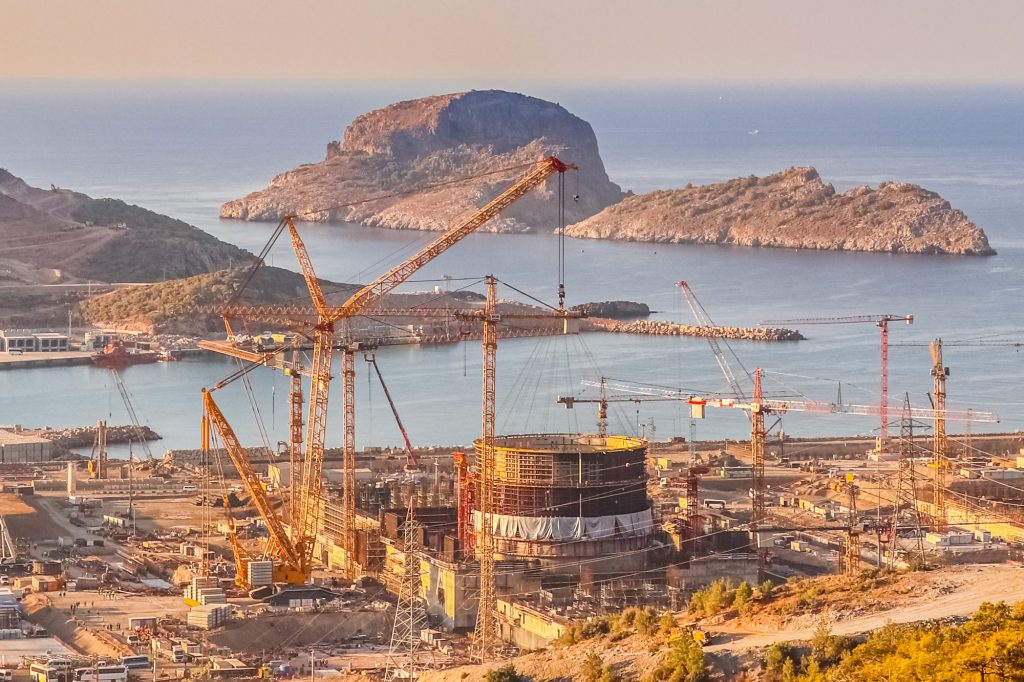
On Thursday, April 27, Vladimir Putin and President Tayyip Erdogan, via videoconference, took part in a solemn ceremony on the occasion of the delivery of Russian-made nuclear fuel to power unit No. 1 of the Turkish Akkuyu NPP. The ceremony was also attended by Director General of the International Atomic Energy Agency (IAEA) Rafael Grossi, Director General of the State Atomic Energy Corporation Rosatom Alexei Likhachev, Minister of Energy and Natural Resources of Turkey Fatih Donmez.
It should be noted that the construction of the station was carried out by the Russian state corporation Rosatom based on an intergovernmental agreement signed in 2010. It is planned to operate four power units with a total capacity of 4,800 megawatts.
Key theses:
- Grossi: “Very rarely do we experience such encounters. Turkey today is entering a new stage both from an economic point of view and from the point of view of the fact that the name of Turkey will already be mentioned in the league of countries producing nuclear energy for peaceful purposes.”
- Grossi: “The IAEA supports the development of this project; technical assistance is being provided. In addition, with Russian partners, employees who will work at this facility are being trained. And thanks to this, Turkey will have all the opportunities it needs, security and simultaneously maintain its independence.”
- Likhachev: “The first unit is in a high degree of readiness; now the installation of equipment is coming to an end there. The reactor vessel is already installed on the second one. In the third stage, the melt localisation device is installed. In the fourth stage, the reinforcement of the foundation of the reactor building is being completed, and the manufacture of the station’s essential equipment, particularly the production of a low-speed turbine, continues.
- Likhachev: “The life cycle of the nuclear power plant we are building in Turkey is at least 100 years, which means that the Akkuyu NPP has every chance to celebrate the bicentennial anniversary of the Republic of Turkey.”
- Donmez: “The Akkuyu nuclear power plant is the largest investment in Turkey’s history that continues to be made. The four reactors will operate 24 hours a day, seven days a week, for 80 years. Approximately ten per cent of our needs will be covered by nuclear power. Thirty-five billion kilowatt-hours will be produced here, and seven billion cubic meters of gas will be imported. This facility will work for Turkey for many years, and Akkuyu will be a new energy generation in Turkey.”
- Putin: “The main thing – I won’t go into details – we agreed to further deepen cooperation in the economy and trade, to stimulate the steady growth of bilateral trade, which exceeded $62 billion in 2022 and also to encourage the inflow of counter investments, to help businesses – structures of the two states to enter each other’s markets.
- Putin: “Russia will continue reliably providing Turkey with energy resources, primarily natural gas. By the way, after Akkuyu works at full capacity, we will probably supply less natural gas to Turkey. This is an expensive product today, and it will only get more expensive, but Turkey will enjoy the advantage of power with its nuclear energy, which is one of the cheapest.”
- Vladimir Putin: “We agreed with the President of Turkey on expanding cooperation in agriculture, establishing reciprocal supplies of agro-industrial products, and coordinating international food security.”
- Erdogan: “Today, there are 422 nuclear reactors in operation worldwide, and 57 of them are under construction. The European Union gets 25 per cent of its electricity from nuclear power. Last year, the European Commission recognised nuclear energy as “green” and eliminated hesitation. Along with our Akkuyu nuclear power plant, we have made our country a part of these developments.”
- Vladimir Putin: “Remember, dear friend, when five years ago you set the task to coincide with the 100th anniversary of the Republic of Turkey, do you remember my reaction? I said that this is unlikely; it is a very complex, responsible process that requires a lot of time and care, thinking about every step. And yet, with your active support, we managed to do it. So it’s a big event.”
Outcomes and outlook:
Akkuyu type project (as well as the Belarusian nuclear power plant, the Paks-2 nuclear power plant under construction in Hungary and other projects) is an attempt to make a breakthrough in the field of atomic energy, positioning itself as a reliable and sought-after partner in the construction of nuclear power plants. Therefore, from Russia’s point of view, this is a severe economic and image project. Also, for Russia, it demonstrates that the international sanctions imposed against it (including nuclear energy) are weak or do not work at all.
From Turkey’s point of view, this is another plus for Erdogan on the eve of the presidential elections (May 14). Moreover, the loading ceremony took place a day after the Turkish media reported on Erdogan’s serious illness, and experts began to discuss whether Erdogan could continue the presidential race. The ceremony actually returned Erdogan’s shaken electoral positions.
In this situation, it is worth noting several frankly flattering statements Putin addressed to his Turkish counterpart. In fact, against the backdrop of several difficulties faced by Erdogan on the eve of the presidential elections, Putin acted as his personal “promoter”. Furthermore, it is worth paying attention to the fact that there are openly anti-Western sentiments among a significant part of Erdogan’s electorate. Moreover, against the backdrop of recent events with the earthquake and the deterioration of the health of the Turkish president, rumours about the possible involvement of the West in both the earthquake and possible attempts to poison the president began to spread in Turkey itself at the household level actively. Such rumours are not supported by any facts but are well-received by certain social groups. In this situation, Putin acted as an additional mobilisation factor for that part of the electorate guided by Erdogan’s policy of distancing from the West.
- Meeting on the development of unmanned aircraft
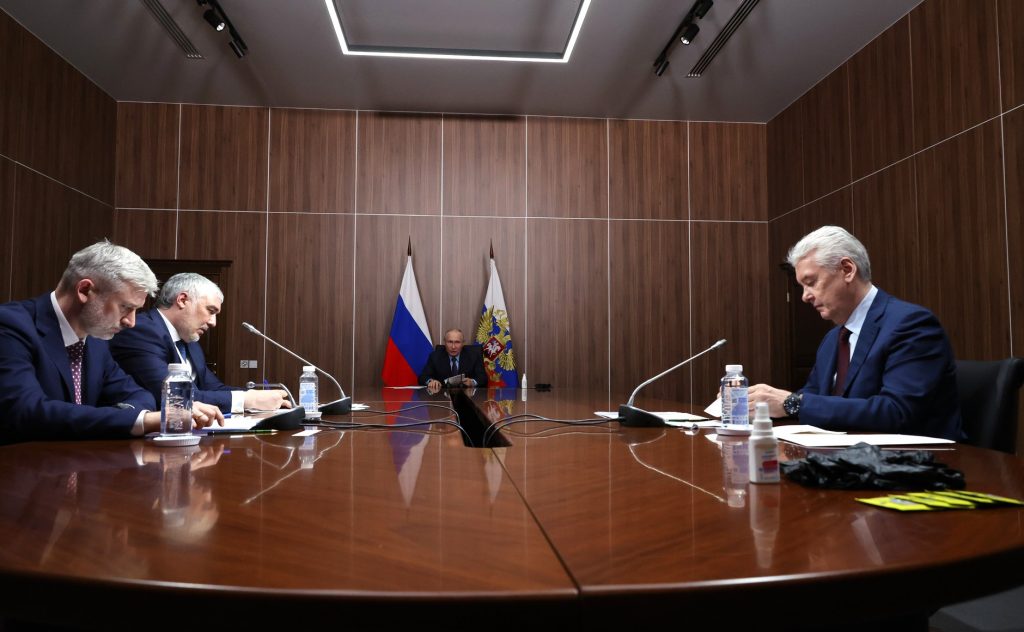
On Friday, April 28, Vladimir Putin held a meeting via videoconference on the development of unmanned aircraft. On the eve of this, Putin visited the Rudnevo industrial park, where he held a meeting with business representatives working in unmanned aircraft. In particular, during the conference, Putin said that 500 billion rubles have already been allocated for the development of this sector in Russia, but this figure needs to be increased to a trillion. At the same time, the meeting discussed the elimination of existing difficulties for the speedy development of the field of unmanned aircraft.
Key theses:
- “The task of the new national project is to use the entire technological potential of a promising industry to strengthen the country’s security, to increase the efficiency of the domestic economy, to improve the quality of people’s lives.”
- “In the coming years, unmanned aerial systems should largely take over the control of the state of industrial facilities, pipeline systems, power lines, almost all critical infrastructure, monitor forests – however, this is already being done in part, but all this in a small and too small modest size, and the possibilities here are colossal in terms of control over all other ecosystems. It is necessary to help with the help of these systems to prevent and eliminate emergencies in a timely manner; we are well aware of them.”
- “Perova – it is necessary to remove outdated administrative, regulatory, and other barriers – now only all entrepreneurs have been talking about this, without prejudice, of course, to safety, to formulate modern, clear and transparent rules for the unmanned aerial vehicle industry.”
- “Secondly, the activity of digital aviation is possible only in a digital environment. Therefore, I repeat once again that implementing digital platforms created using Russian software and artificial intelligence technologies is necessary – we also talked about this many times today.”
- “The third is the formation of cluster sites for the production of unmanned aerial systems and ground infrastructure for them.”
- “The most important condition for the development of the industry is the formation of demand for domestic drones, primarily due to the state order, and not least, and maybe even first of all, the civil order.”
- “This year in Russia, the volume of the drone market in Russia is approximately 32,000 units, of which about 20,000 are imported from other countries, and only 12,000 are domestic drones, produced mainly in the assembly mode from imported components and accessories. That is, the level of localisation, the level of coverage of consumption by domestic production is today a little more than one third, 37 per cent.”
Outcomes and outlook:
The meeting on unmanned aircraft was planned for a long time. In Russia, the question has been repeatedly raised that this industry has yet to receive development – even though since 2007, huge funds have been allocated for the design and launch of their Russian drones. As a result, the lack of drones and the need to purchase them from Iran and China led to a number of high-profile resignations and even criminal cases. At the end of 2022, Putin set the task of launching drones as soon as possible before Deputy Prime Minister Denis Manturov. Over the past six months, Manturov managed to get the situation off the ground – otherwise, a) the current meeting would not have taken place; b) if it had taken place, then according to its results, resignations would have followed – including Manturov. The fact that the industry will receive an additional trillion rubles is a significant hardware victory for the Chemezov-Manturov group, which many experts predicted almost leaving the political arena.
In this matter, it is worth paying attention to another critical factor. By appealing to the development of innovative industries, Putin sends a signal to the younger generation of businessmen and technocrats who are increasingly confidently building their own positions, competing with the “Kremlin oligarchs”. Also, this is a specific message of the youth, demonstrating the prospects for developing technological clusters in Russia.
According to Ascolta, Russia has been actively negotiating with Iran and Turkey over the past few months to purchase technologies actively developed in these states. Including we are talking about UAVs, in which both Turkey and Iran demonstrate significant success. This scheme will likely be implemented with the participation of Uzbekistan and Tajikistan, where several new enterprises for the production of UAVs have recently been built.
- Activation of Evgeny Prigozhin in the information space
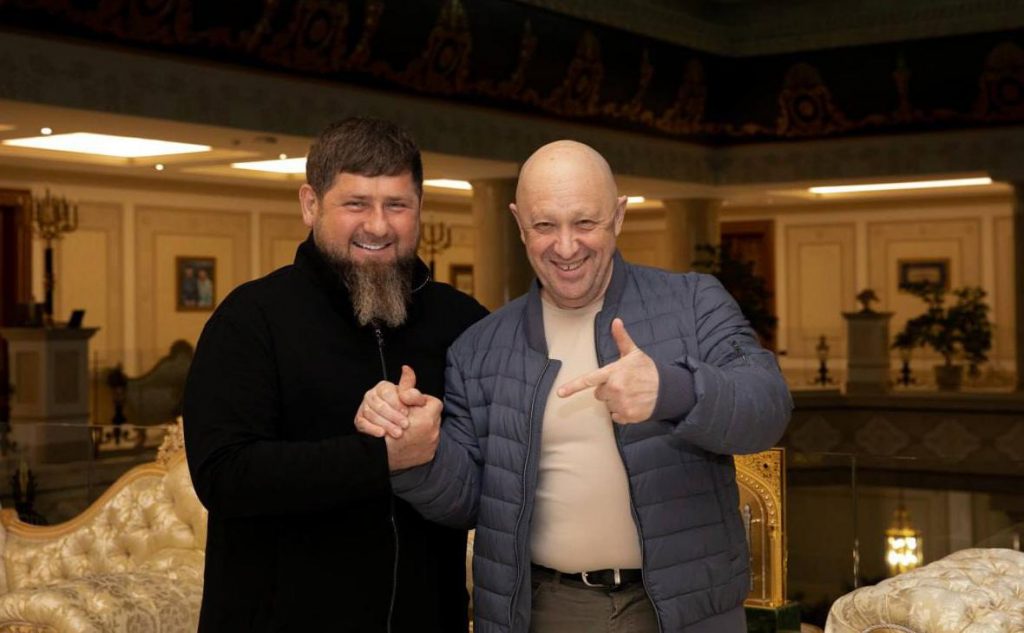
Throughout the past week, the statements of Yevgeny Prigozhin, the curator of Wagner PMC, provoked heated discussions and provoked new rumours both about his political future and about the intensification of the conflict within the political elites.
Timeline:
- On Tuesday, April 25, Ramzan Kadyrov announced his meeting with Yevgeny Prigozhin: “We met with dear BROTHER Yevgeny Prigozhin. We discussed the top issues of an international character. With Evgeny Viktorovich, we always have something to talk about; after all, we have a lot of similar interests, and quite often, we perform common tasks that you can’t talk about by phone. I will not disclose details. You will know about the results soon. And yes, we discussed the most topical agenda. And the faces are so joyful because a small part of the conversation was devoted to the sanctions of the West against both of us. We laughed at this absurdity for a long time.”
- On the same day, Prigozhin gave an interview to the English-language periodical DefenseWeb, in which he responded to accusations against the activities of Wagner PMCs in African states and noted that the participation of his PMCs on the continent is mainly aimed at combating terrorism and helping countries liberate their territories from rebels. Prigozhin also emphasised that he has nothing to do with the Kremlin: “I will tell you that the rumours about my acquaintance with President Putin are very exaggerated. Of course, I talked with him, but the gossips about our acquaintance were just gossip.
- On Thursday, April 27, Yevgeny Prigozhin announced that he was allegedly suspending artillery work in Bakhmut because the Ukrainian military had brought American journalists there: “A decision was made to suspend artillery fire so that American journalists could safely shoot Bakhmut and go home. The press is sacred,” Prigozhin said. But just an hour later, he said that he was joking about stopping the fire: “We are sitting at the headquarters; we received information that American journalists were moving from Chasov Yar to Bakhmut, accompanied by Cerberus, the commander of the 57th brigade of the Armed Forces of Ukraine, whom we have been hunting for a long time, we just can’t catch his. So we decided to screw up. I made a statement to the media; all the media came out with headlines: “Prigozhin suspended fire, Wagner is allowed to call in American journalists, the attack on Bakhmut has been suspended.” Guys, this is such military humour, humour and nothing but humour,” said Prigozhin.
- On Saturday, April 29, Prigozhin’s interview was published with Russian military commissar Semyonov Pegov (part of Prigozhin’s journalistic pool), in which he stated that he had written a letter to Shoigu, saying that if the problem with the supply of ammunition for “Wagner”, then the PMC will leave their positions in Bakhmut and expose the front. According to Prigozhin, the eve of the expected offensive of the Armed Forces of Ukraine (according to his forecast, it will begin no later than May 15) can lead to catastrophic consequences for Russia. In an interview, Prigozhin spoke extremely badly of both the Russian command and the Russian army as a whole (“We must forget the word “Airborne Forces are doing something in Bakhmut’”).
- During the same interview, Prigozhin repeatedly spoke negatively about Shoigu for the recent dismissal of Russian Deputy Defense Minister Mikhail Mizintsev, with whom Prigozhin, according to him, had a good relationship. Mizintsev oversaw the supply and support of the Russian troops – an area in which huge money is being mastered now.
- On Sunday, April 30, Yevgeny Prigozhin said that the Wagner PMC occupied 58,000 square kilometres in Bakhmut and the region, and 2.9 square kilometres remained under the control of the Armed Forces of Ukraine. In this statement, he also criticised the leadership of the Russian Ministry of Defense: “The number of dead 99 people among the fighters of the Wagner PMC would have been five or even more times less if it were not for the near-military bureaucrats who limit the amount of ammunition received, creating an artificial shortage of shells”.
Outcomes and outlook:
Yevgeny Prigozhin continues to play the role of a “non-systemic player”, although he carefully coordinates his actions with the Presidential Administration of the Russian Federation. Therefore, our preliminary prediction is that Prigozhin will have a special place in Putin’s future presidential campaign (Prigozhin as a prominent representative of the hawk party) and an important place in the future political system (as a substitute for Zhirinovsky, “Zhirinovsky in action”) receives additional confirmation.
Such activity of Prigozhin would hardly have been possible if the Presidential Administration had not commanded the media to assist “Putin’s cook” in every possible way. In principle, Prigozhin is positioned as a counterbalance to the “snickering cats” in the Ministry of Defense and the bureaucracy, as a kind of “truth-seeker” and spokesman for the opinion of ordinary fighters at the front. For the West, Prigozhin will be presented as a kind of alternative to Putin – if you don’t want to deal with Putin, you will deal with Prigozhin. Do you like the choice? Well, and most importantly, there is an attempt to wash Prigozhin of the nickname “Putin’s cook” to present him as an independent political figure.
- Interview with US Ambassador to Russia Lynn Tracy for Kommersant
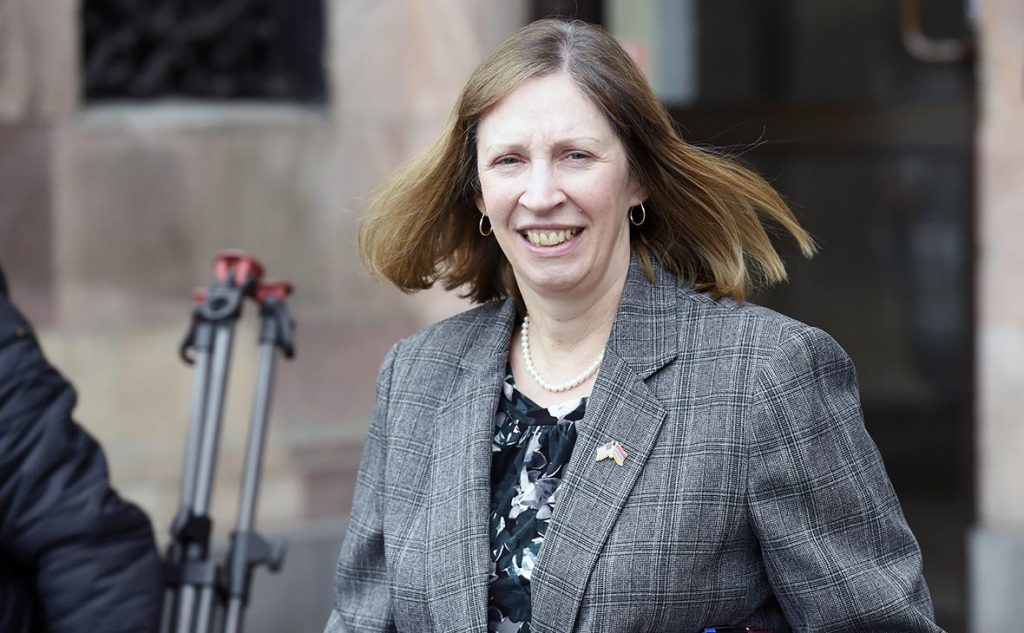
On Thursday, April 27, new US Ambassador to Russia Lynn Tracy gave her first interview to Russian media (she arrived in Moscow in January 2023). In an interview, Tracy assessed the state of bilateral relations and the prospects for arms control, told what surprised her in the new Russian Foreign Policy Concept, and also answered questions about the non-issuance of visas to journalists from the pool of the Russian Foreign Ministry.
Key theses:
- “I made friends and acquaintances from among the citizens of Russia, with whom I have developed warm relations. And in particular, this is why I believe in and support public diplomacy: I had seen the positive impact of these contacts in other periods when intergovernmental relations were at a low level. Whatever differences we, the United States, have with the Russian government, they are not differences with the people of Russia.”
- “It is sad to see in what direction Russia is moving: it seems that it is moving into the past, during the times of repression. When I was here in the late 1980s, I remember how the rehabilitation of Nikolai Bukharin electrified society, how there was a feeling that one could finally speak honestly and openly about the past. Therefore, it is so sad and disturbing to see how the voices of dissent and memory are again drowned out. And here, you know, the question arises: How does this help the future of Russia?
- “I agree that our relationship is at one of the lowest points that can be remembered for a long time. But, as you understand, the United States has a different view of the circumstances that led to this, and I think it is important to understand this.”
- “Looking back now, I see that Russia misinterpreted the situation in Ukraine in 2014. And misinterpreted it again in 2022 and continues to do so.”
- “Russia made a miscalculation – judging by how it decided to enter Ukraine, clearly expecting the Ukrainians to greet the troops that entered, and the Ukrainians did not. On the contrary, the Ukrainians responded with resistance; we see this resistance, it is not a product of propaganda. On the contrary, Ukrainians demonstrate the will to fight and defend their country.”
- “In general, in terms of US-Russian relations, I would like to emphasise that the United States does not consider Russians enemies.”
- “Yes, I would also like to say about a very strange reference [in the new concept of Russian foreign policy] to the “Anglo-Saxons”. There is something almost medieval in this term. I won’t be surprised if I hear about the Varangians soon.”
- “The United States understands that we have no greater responsibility than to protect the world from the risk of nuclear war. That is the purpose of START.”
Outcomes and outlook:
The interview of the US Ambassador to the Russian Federation is notable for “lowering the degree” of confrontation. Lynn Tracy, a sophisticated diplomat with vast experience in Russia and extensive connections among Russian politicians, hardly expressed a personal opinion. This is a signal from the United States that they would not want to aggravate relations to the level of open confrontation.
Conciliatory formulas and mild characterisations signal that the US State Department is ready to continue the dialogue with Russia. True, we can hardly talk about the warming of relations, which was observed during the times of Gorbachev and Reagan. Still, after this interview, we can expect a gradual shift in the negotiation process. And this will concern not only and not so much the issue of Ukraine but other important issues in the relationship between Moscow and Washington – first of all, this affects the pace of rapprochement between Russia and China, their joint programs in the Pacific Ocean and the Arctic (the most painful topic from the point of view of United States), the Middle East issue, the resumption of negotiations on strategic offensive arms control, and so on. According to the law of the genre, we should now expect a similar interview of representatives of the Russian side in the influential American media.
- Speech by the Minister of Foreign Affairs of the Russian Federation Sergey Lavrov at the UN
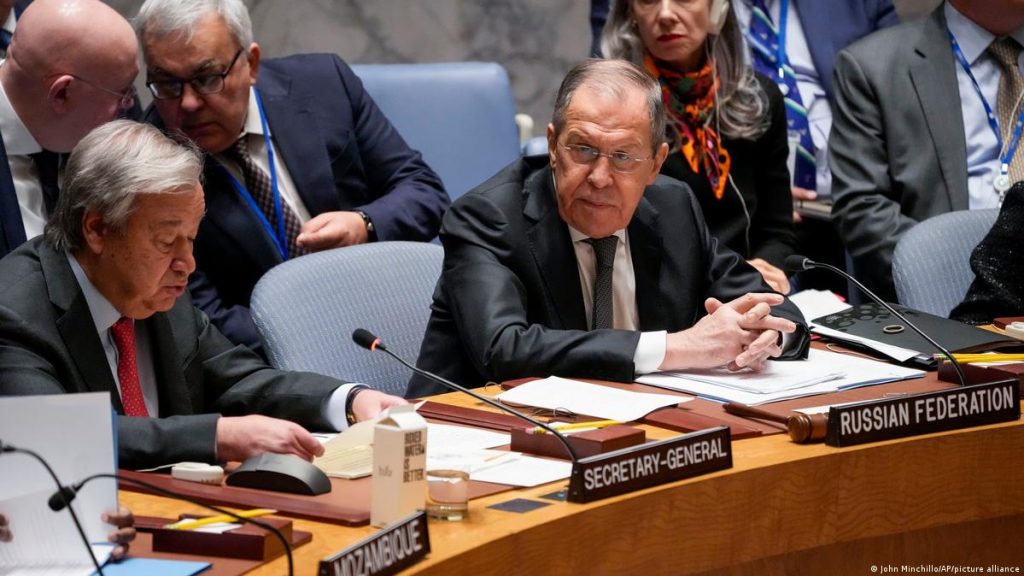
On Monday, April 24, Russian Foreign Minister Sergei Lavrov made a speech during the open debate of the UN Security Council on the topic “Effective multilateralism through the defence of the principles of the UN Charter.”
Key theses:
- “For almost 80 years of existence, the UN has been fulfilling the most important mission entrusted to it by the founding fathers. For several decades, the basic understanding of the five permanent members of the Security Council on the supremacy of the purposes and principles of the Charter guaranteed global security. And thus, it created the conditions for a truly multilateral cooperation, regulated by the universally recognised norms of international law.”
- “Now the UN-centric system is going through a deep crisis. The root cause was the desire of individual members of our organisation to replace international law and the UN Charter with a kind of “order based on rules.” Nobody saw these “rules”, they were not the subject of transparent international negotiations. On the contrary, they are invented and applied to counteract the natural processes of forming new independent development centres, which are the objective manifestation of multilateralism.”
- “It has long become “inconvenient” for Western colleagues to negotiate in universal formats, such as the UN. To substantiate the policy of undermining multilateralism ideologically, the theme of the unity of “democracies” as opposed to “autocracies” has been put into circulation. In addition to the “summits for democracy”, whose composition is determined by the self-proclaimed hegemon, other “clubs of the elite” are being created that bypass the UN.”
- “At last year’s summit in Madrid, NATO, which has always convinced everyone of its “peacefulness” and the exclusively defensive nature of its military programs, declared its “global responsibility”, the “indivisibility of security” in the Euro-Atlantic and the so-called Indo-Pacific region. That is, now the “line of defence” of NATO (as a defensive Alliance) is moving to the western shores of the Pacific Ocean.
- “Russia patiently tried to reach mutually beneficial multilateral agreements based on the principle of the indivisibility of security, which was solemnly proclaimed at the highest level in the documents of the OSCE summits in 1999 and 2010. It is directly and unambiguously written in black and white that no one should strengthen their security at the expense of the security of others, and no state, group of states or organisation can be given primary responsibility for maintaining peace in the Organization’s region or consider any part of the OSCE region as its sphere of influence.”
- “The shameful invasion of the US-led coalition into Iraq in 2003 was carried out in violation of the UN Charter, just like the aggression against Libya in 2011. The result is the destruction of statehood, hundreds of thousands of deaths, rampant terrorism.”
- “Our Secretary General A. Guterres said beautifully in his address to the “Second Summit for Democracy” on March 29: “Democracy stems from the UN Charter. His first words – We, the peoples – reflect the fundamental source of legitimate power: the consent of those who are ruled. Agreement. Let me stress this again.”
- “Against the background of the hysteria whipped up by the US and the EU, I would like to ask in contrast: what did Washington and NATO do in Yugoslavia, Iraq, and Libya? Were there threats to their security, culture, religion, and languages? What multilateral norms were they guided by, declaring the independence of Kosovo in violation of the principles of the OSCE, destroying the stable, economically prosperous states of Iraq and Libya, located ten thousand miles from the American coast?
- “Our common duty is to preserve the United Nations as a hard-won example of multilateralism and coordination of world politics. The key to success is working together, renouncing pretensions to anyone’s exclusivity and – I repeat once again – respect for the sovereign equality of states. This is what we all signed by ratifying the UN Charter.”
Outcomes and outlook:
For Sergey Lavrov, it was important to use the UN rostrum as a speaking platform to demonstrate that Russia remains an important political player and is not a complete pariah in the modern world. His statements were easily predictable – he did not say anything new. The very fact of Lavrov’s presence in New York is essential. It was also crucial that Lavrov, who previously criticised the UN for its inability to fulfil its functions in the modern world, called for the UN to be preserved as an instrument for finding compromises.
From this, we can conclude that Russia does not reject the UN mechanism if it is necessary to find a way out of the current “Ukrainian impasse”. On the contrary, it is quite possible that this structure, as agreed between the major world players (USA, China), will play its role in resolving the conflict between Russia and Ukraine. Moreover, the importance of the UN itself is clearly spelt out in the so-called “peace plan” of China, which does not allow Russia to argue with this position.
Such visits by Lavrov are usually accompanied by undisclosed meetings with representatives of the American establishment – and Lavrov has formed a sizeable potential circle of contacts over the long years of his work in the United States. Therefore, the fact that the media did not provide information about Lavrov’s informal meetings does not mean they did not occur. And from this, attention to the visit and stay of Lavrov in the United States becomes even more significant.
At the same time, Russian political circles once again intensified the discussion of Lavrov’s imminent resignation, which he had asked for more than once. In his place, several possible candidates are predicted at once, the most likely of which is Deputy Foreign Minister, former Russian Ambassador to Japan Mikhail Galuzin. In this situation, it is hardly worth discussing Lavrov’s speech at the UNPO as a farewell. Still, his age and health (the condition in Indonesia) indicate that such rearrangements may occur shortly.
- Diplomatic scandal between Russia and Poland
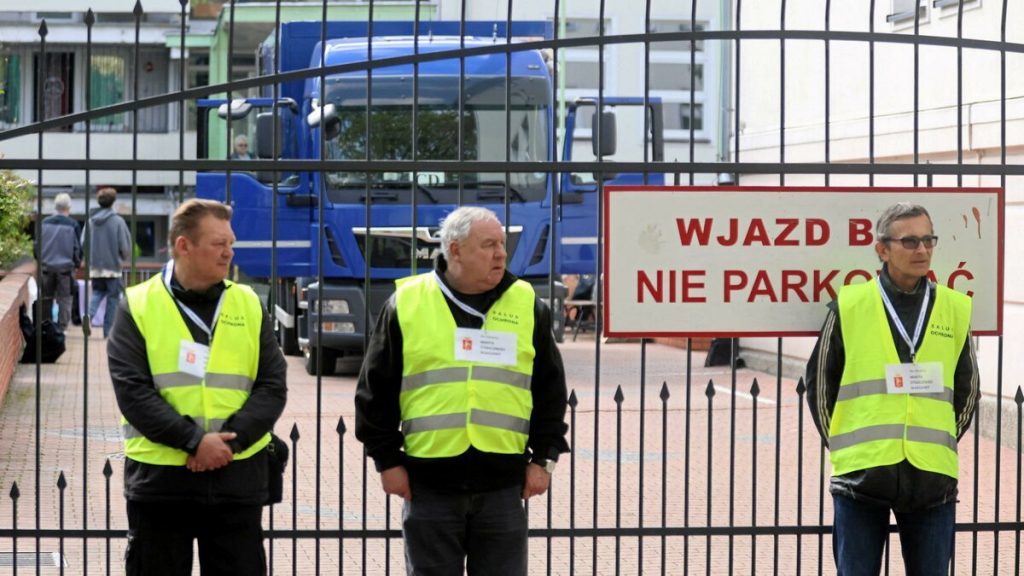
On Saturday, April 29, representatives of the Warsaw City Hall, accompanied by police officers, arrived at the Russian Embassy in the Warsaw school building to enforce the decision to confiscate the building. They demanded that the Russian embassy open the gate in front of the school, but, having received a refusal, they broke it down and entered the premises. In addition, they hung a chain with a lock on the gate so that property could not be taken out of the school. This event gave rise to several rather harsh statements on both sides.
Timeline:
- Minister-Counselor Andrey Ordash said that the Russian side considers Warsaw’s actions illegal and warned of retaliatory diplomatic steps. He also stressed that there are people with diplomatic status on the school grounds. The Polish authorities demanded that the school staff leave the building before 19:00 Moscow time.
- Russian Ambassador to Poland Sergei Andreev called the actions of the Polish authorities a flagrant violation of the Vienna Convention and legal arbitrariness. The Russian Foreign Ministry promised to take retaliatory measures.
- Polish Foreign Ministry spokesman Lukasz Jasina said the Russian ambassador has the right to protest. “I don’t know yet whether he did it; we await it. Our opinion, confirmed by the courts, is that this property belongs to the Polish state and is illegally occupied by Russia.”
- On Sunday, April 30, Russian Foreign Ministry spokeswoman Maria Zakharova said that Moscow has every right to break diplomatic relations with Warsaw. Still, Russians living in Poland may suffer.
Outcomes and outlook:
Earlier, the Polish Foreign Ministry petitioned to open a case against “two real estate objects that are not used for diplomatic and consular purposes and are in the illegal possession of the Russian Federation.”
There were two addresses. On the first of them, there is a school at the Russian Embassy, and on the second Russian diplomats used to live, but now the building is not inhabited and needs to be repaired.
In fact, we are dealing with a “casus belli”. Poland has long been the primary irritant of Russia (after Ukraine) and has made various attacks on the Russian Federation. For Russia, Poland is seen as one of the main attack targets. Moscow understands that Poland is an outpost of British and, to some extent, American policy in Eastern Europe (as well as the Baltic states). But Russia cannot fail to respond to the school’s closure (albeit practically not working).
That is why the school is becoming a new stumbling block, a new point in the aggravation of relations between Russia and one of the EU and NATO members. But, significantly, this aggravation is taking place against the backdrop of attempts by Russia and the United States to agree on some options for de-escalating relations. That is, we are dealing with attempts to prevent a decrease in the degree on a global scale, and London’s interest in this process, which skillfully directs the operations in the right direction, betrays a lot in this process.
- Publication of a recording of a conversation between Russian billionaire Roman Trotsenko and businessman Nikolai Matushevsky
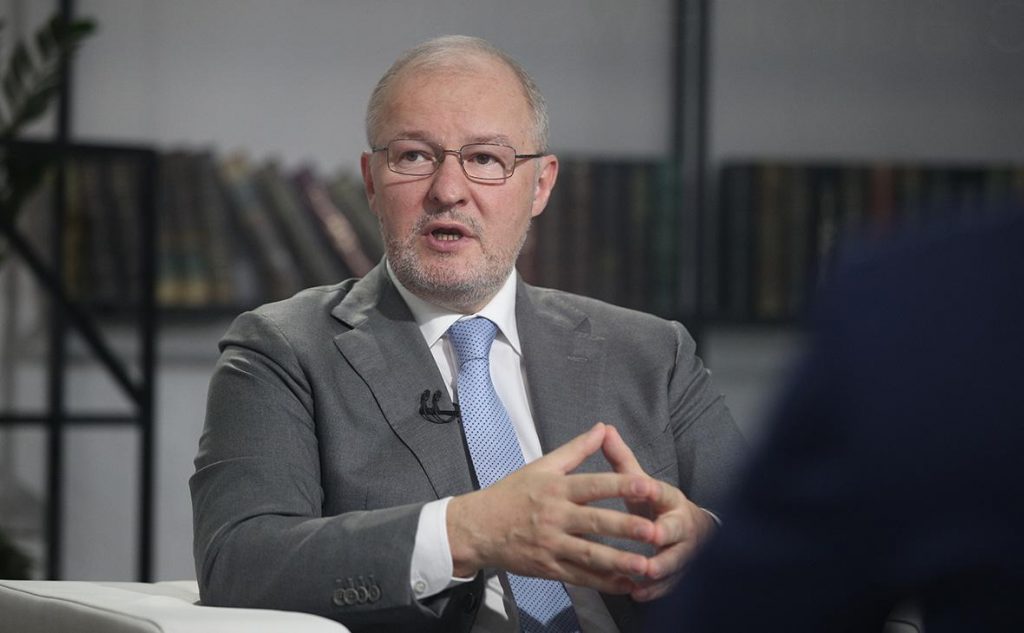
On Wednesday, April 26, a recording of a telephone conversation between Russian billionaire Roman Trotsenko and businessman Nikolai Matushevsky appeared on the network. In a conversation, Trotsenko remarks to Matushevsky, who has left for Bali, that in Indonesia, “in ten years, everything will grow tenfold, and in Russia, it will fall twice.” The interlocutors also made several harsh statements against the Russian authorities and discussed the political system in the country.
Key theses:
- Trotsenko: “Unfortunately, Russia, which we love so sincerely, ended up in the clutches of some asshole, [damn]. Who profess, [damn], some strange compositions, [damn], XIX century. This can’t end well; this will end in hell, [damn]. People will kill each other on the streets of Moscow.”
- Trotsenko: “Everything is falling apart in Russia, [damn]. Fate has given you a year to pull out all your loved ones, money, and everything you need. Do it tomorrow.”
- Matushevsky: “And this “we will win” has been going on for 20 years. How can a person run the country whom every year says that “it was a difficult year” and since 2014 – that “everyone is an enemy, but we will win.”
- Matushevsky: “How can a country live and develop where the only ideology is to earn money and hold power by one group of people? There is no concept of “more”. They will fucking die at some point in time and leave nothing behind. It will just be a scorched desert.”
Outcomes and outlook:
Even if we assume that this entry is fake (which both defendants have already stated), the very moods of the Russian elites are indicative. Moreover, the fact that the published information was believed shows that the theoretically discussed things could be dealt with since they correspond to the mood in the Russian business environment.
Indeed, many businessmen in the Russian Federation expressed concern and dissatisfaction with the fact that Putin has plunged the country into a new confrontation with the West. In contrast, many markets and assets for Russian businesses have been irretrievably lost. The Russian elites are directly asking the question: Why was there an invasion of Ukraine? What did they gain from this? Less than a year before the presidential election, such sentiments seem dangerous to many in the Kremlin.
According to Ascolta, if Putin can expect some blow, then not from Navalny, Ponomarev or other “oppositionists” but from the consolidated position of representatives of big business (neo-oligarchic).
- Discussion of the “grain deal”
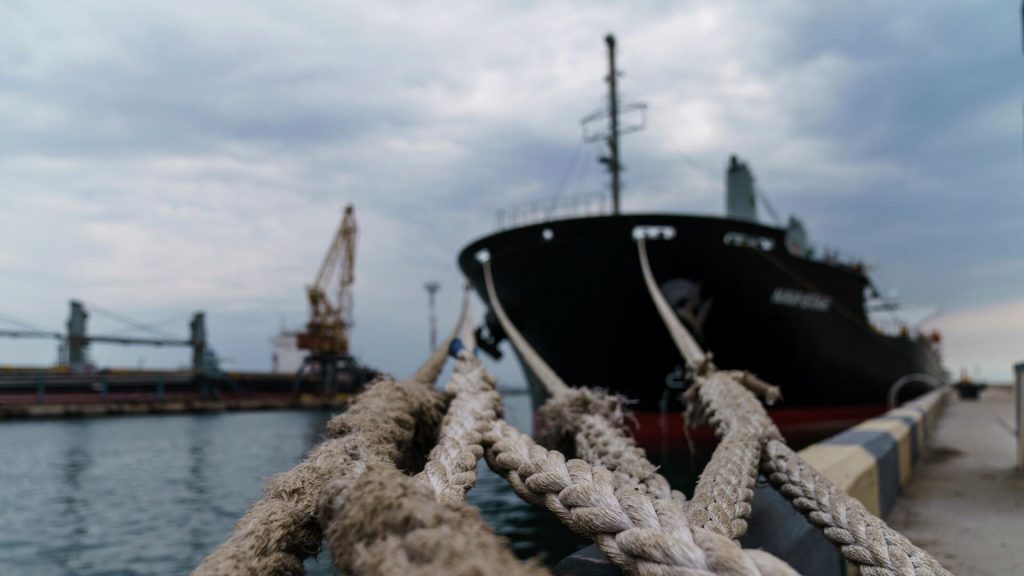
As the next deadline for extending the “grain deal”, which expires on May 18, approaches, discussions on the possibility of further operation of grain corridors and participation in the agreements of the Russian side have intensified significantly. Recently, official Moscow made several statements that made it clear that it does not plan to agree on the following extension deadlines without satisfying Russian interests. In particular, on April 20, the Russian Foreign Ministry published a list of requirements, including the restoration of the Togliatti-Odessa ammonia pipeline, the reconnection of Rosselkhozbank to SWIFT, the resumption of supplies of agricultural machinery, spare parts and services, the abolition of restrictions on insurance and reinsurance of ships with Russian food and fertilisers, plus the lifting of the ban on the access of such vessels to ports, the unblocking of foreign assets and accounts of Russian companies associated with the production and transportation of food and fertilisers.
Timeline:
- On Tuesday, April 25, Putin’s spokesman Peskov said that the circumstances were “not in favour of extending the grain deal” and that Ukrainian and Russian grain could disappear from the world market.
- On Wednesday, April 27, Russian representatives at the Joint Coordination Center in Istanbul on April 25 refused to coordinate the movement of ships to/from the seaports of Ukraine along the “grain corridor”.
- On Friday, April 28, UN Secretary-General Guterres handed over a letter to Putin in which he described the efforts to implement the grain deal, including Russian food exports.
- On the same day, Turkish President Recep Erdogan received from the UN a “road map” on a grain deal, which implies cooperation with Turkey in paying for Russian agricultural products.
- Later, Turkish Foreign Minister Mevlut Cavusoglu explained why the grain deal could fail. According to him, Russian grain and fertilisers were removed from sanctions. But the financial and insurance services for these transactions are not: “In terms of payments, insurance and banking services, as well as the export of Russian ships, access to ports is still a problem,” Cavusoglu said.
- On Sunday, April 30, the head of the Turkish military department, Hulusi Akar, in an interview with the Habertürk TV channel, said that in the coming days, representatives of Russia, Ukraine and Turkey would discuss the extension of the “grain deal”.
Outcomes and outlook :
The remaining two weeks before the “grain deal” completion show that Russia will be more active than in February-March, using the prospects for extending the “grain deal” to push through its political goals. Putin is beginning to demonstrate this more and more actively. For him, the “grain deal” is both an opportunity for lobbying Russian business interests and an element of pressure on Turkey on the eve of the presidential elections and an opportunity for behind-the-scenes agreements with representatives of elite groups in Turkey.
That is why it is quite possible that the process of extending the “grain deal” will be stretched out in time; moreover, from the point of view of Russia, this process can be used to push through in the West a formula of peace that is beneficial for Russia since the current negotiations on the “grain deal” are negotiations regarding contracts for the supply of Ukrainian grain of the 2023 harvest. In this regard, it is in May-June that the West becomes vulnerable, which the Russian side can use. Therefore, a new round of negotiations for Ukraine may bring additional risks: the West may begin to push Ukraine to make unfavourable decisions, which, according to Russia’s plan, should become the basis for extending the “grain deal”.
- Nomination of the candidacy of Dmitry Tabachnik for elections on the lists of “Yedinaya Rossiya”
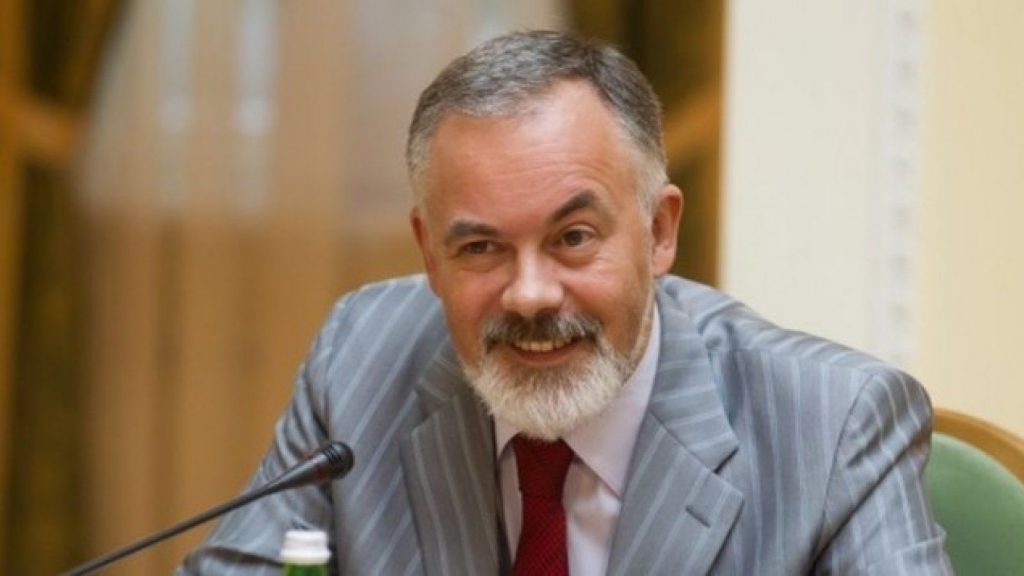
On Friday, April 28, information appeared about the nomination of the candidacy of the ex-Minister of Education of Ukraine, Dmytro Tabachnyk, for deputies in the temporarily occupied territory of the Zaporizhzhia region. Also, the information about Tabachnyk indicates that he is currently unemployed but holds the position of adviser to the “head” of the temporarily occupied territory of the Zaporizhzhia Oblast Yevhen Balitsky.
It is worth noting that this is not the first confirmation of Tabachnik’s cooperation with the “authorities” of the temporarily occupied territories. Previously, he was seen at the funeral of Kirill Stremousov. Also, Ascolta’s sources have repeatedly reported on his active involvement in the political life of the temporarily occupied territories of Ukraine.
Outcomes and outlook:
Dmitry Tabachnik is far from a minor person. This is a strong trump card in the hands of the occupation authorities. The current political model of Ukraine, the system of power, the Constitution – all this is a product of the activities of Dmitry Tabachnik when he headed the Presidential Administration (1994 – 1996). From Russia’s point of view, this is a symbolic move: We use the one who created it to destroy Ukraine. Even though Tabachnik’s position is very decorative, and he has long since moved away from politics, his appointment is precisely symbolic.

